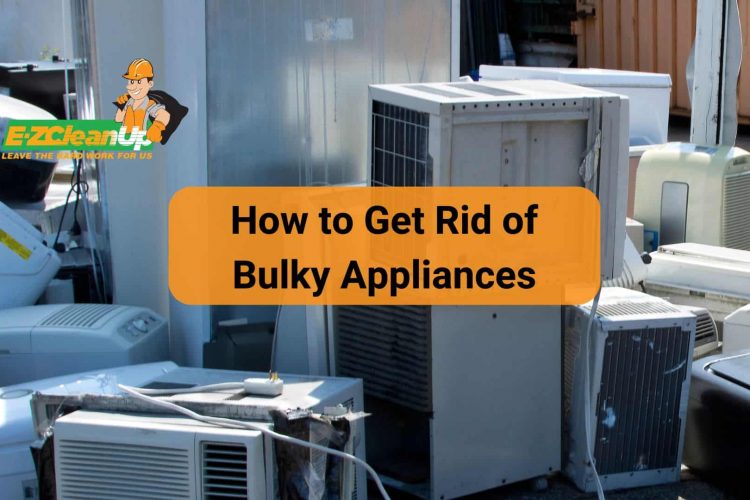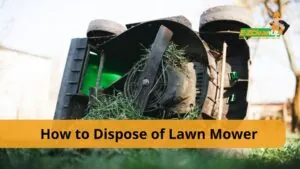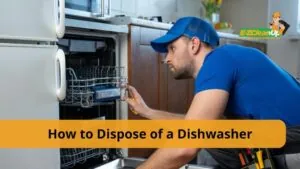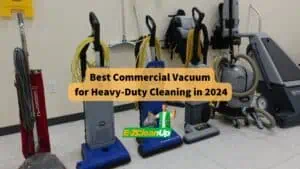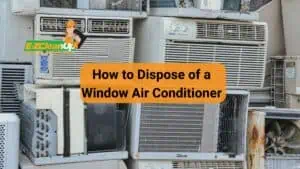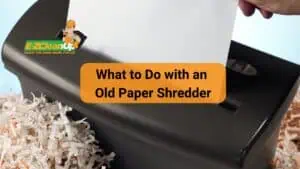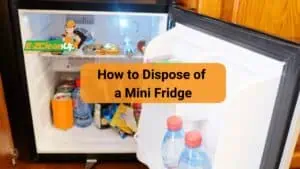To manage bulky appliance disposal, start by assessing each item’s functionality. Operational appliances can be donated or repaired, while non-functional ones may need recycling. Remove hazardous components under professional guidance, and always ensure compliance with environmental regulations.
Wanna learn more about how to get rid of bulky appliances, tips to prepare, and what to do with them? Read our guide below.
Preparing and Assessing Bulky Appliances for Disposal
It’s important to assess each appliance before deciding what to do with them. Here’s a look at the preparation steps you need to accomplish, depending on the appliance that you want to get rid of.
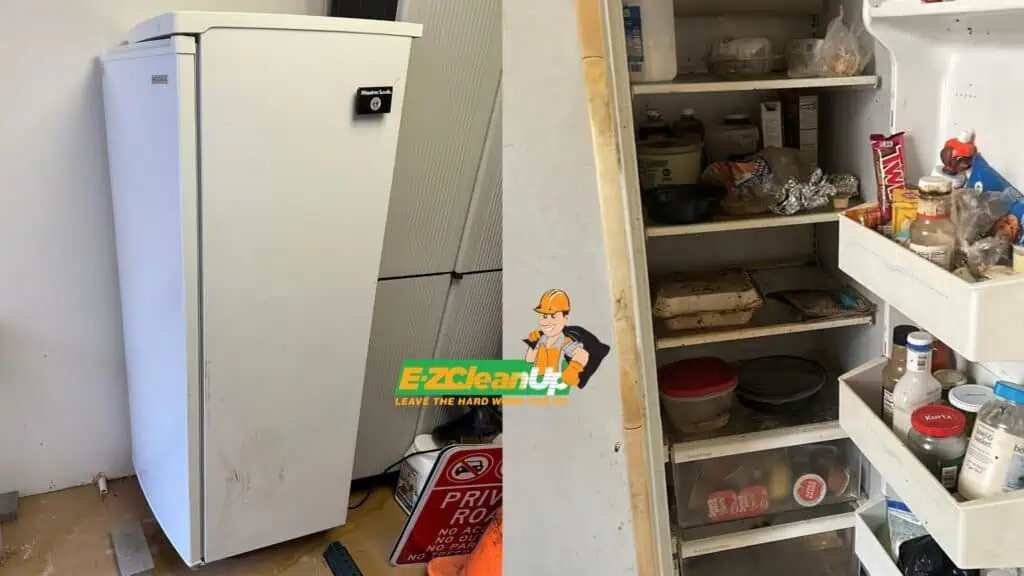
Refrigerators & Freezers
Before deciding how to dispose of a refrigerator or freezer, determine whether it’s functional. If the appliance is still operational, it could be donated to extend its useful life. This can benefit someone in need while reducing waste. However, if it’s non-functional, consider recycling options tailored for appliances that can no longer be repaired.
Removing Hazardous Components (Freon, if applicable)
Handling hazardous components, such as Freon (a refrigerant), is essential due to environmental regulations. Appliances built before 1995 might contain ozone-depleting substances like CFCs or HCFCs, which need special handling.
The U.S. Environmental Protection Agency (EPA) mandates that all refrigerants be recovered by a certified technician before the appliance is dismantled or recycled.
Furthermore, components like mercury switches, thermostats, and oils that might be contaminated with refrigerants need to be handled and disposed of by specialized recyclers to prevent environmental damage.
For proper fridge disposal, contact local retailers, as many offer recycling programs. It’s also beneficial to check with your waste management service to understand the specific requirements and services available in your area, like curbside pickup for appliances, which often require pre-scheduling.
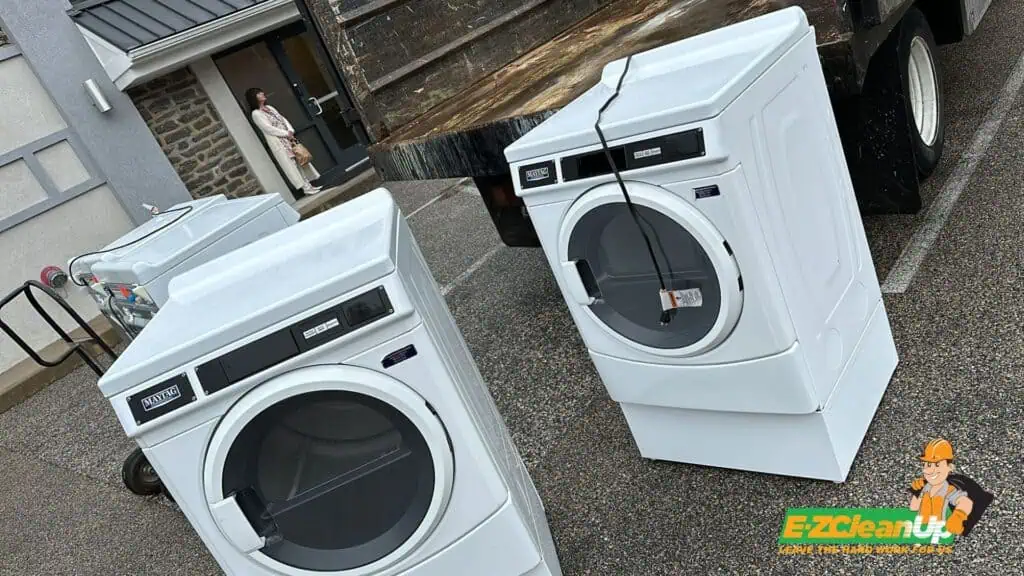
Washers and Dryers
When considering the disposal of washers and dryers, first assess whether they are still efficient or require repairs. Older models may not be as energy-efficient or may have worn-out parts that are costly to replace.
If repairs are feasible, this could be a more sustainable option than disposal. Check for common issues like small water leaks, strange noises, or inefficiency in drying clothes, as these can be indicators that repair might be necessary.
Preparing for Disposal (Disconnecting and Cleaning)
Once you decide to dispose of your appliance, ensure that the washer is disconnected from the water supply, and if your dryer uses natural gas, disconnect it safely. It’s recommended to consult a professional if you’re unsure how to safely manage these connections.
Clean the appliances to remove any debris, lint, or residue that could pose a problem during recycling. Removing doors can facilitate easier handling and transportation.
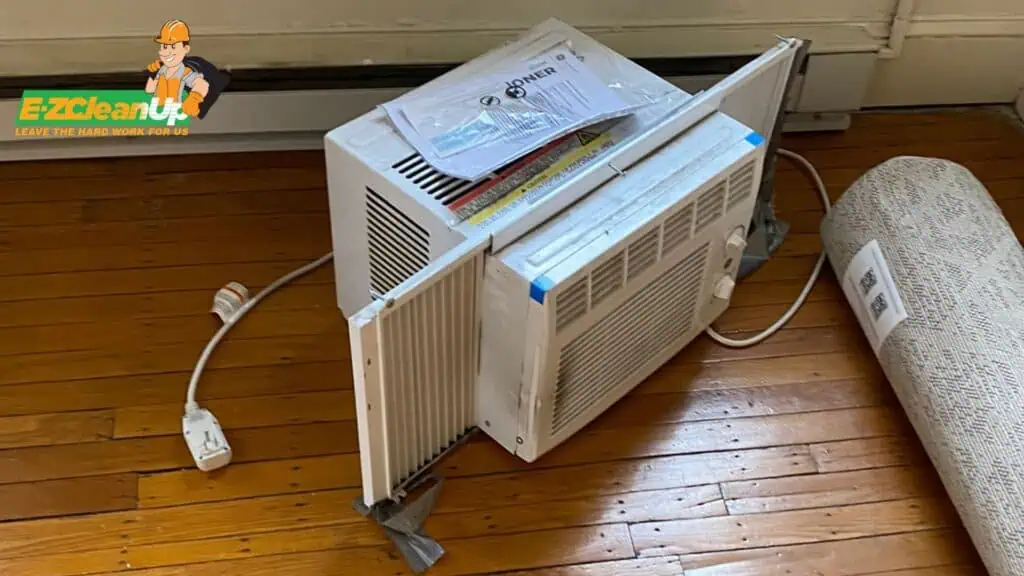
Air Conditioners
Air conditioners contain refrigerants, which are substances that require careful handling due to their potential environmental impact. The EPA mandates specific procedures for the recovery of refrigerants during the disposal process.
This is critical to prevent the release of substances that could deplete the ozone layer or contribute to global warming. The refrigerants must be recovered by certified professionals who use specialized equipment to ensure that these gases are not released into the atmosphere.
It’s illegal to release these refrigerants during disposal, and non-compliance can lead to significant fines.
Assessing Condition for Repair vs. Disposal
Before deciding to dispose of your air conditioner, consider if a repair could extend its life. Contacting AC repair contractors to assess the unit can potentially save you money and reduce environmental waste.
If the air conditioner is beyond repair, then proper disposal is necessary. Certified HVAC professionals can assess the system, safely recover the hazardous refrigerants, and advise whether repair or replacement is the most cost-effective and environmentally friendly option.
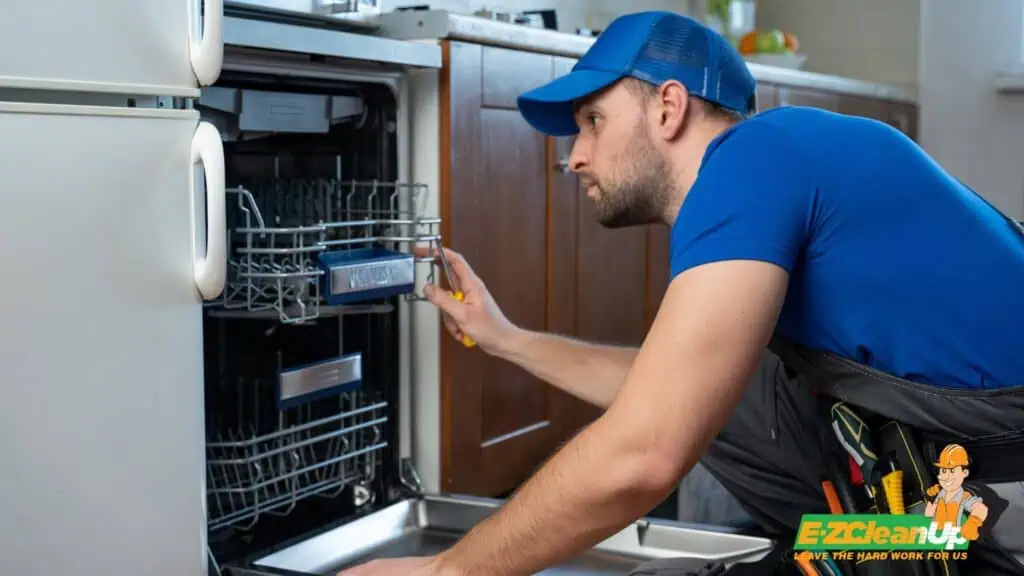
Dishwashers
Before deciding on disposal, assess whether the dishwasher is still operable or can be repaired. Check for common problems, which include the following:
- Leaks: Inspect the door seal for damage or wear and check hose connections for tightness to prevent leaks. These are often the primary sources of leakage and can sometimes be repaired with replacement parts.
- Operational Efficiency: Listen for unusual noises or check if the dishwasher stops mid-cycle, which could indicate a malfunctioning pump or motor. These issues may require more extensive repairs or could cause the appliance to be more trouble than it’s worth keeping.
Disconnecting and Preparing for Removal
Once you’ve decided to dispose of your dishwasher, ensuring it’s properly disconnected is crucial to avoid any accidents or damage:
- Power and Water Supply: Disconnect the dishwasher from the power supply and shut off the water supply. This is typically done at the main electrical panel and the water shutoff valve under a nearby sink.
- Prepare for Transport: Secure any loose parts and clean the unit. This not only makes the dishwasher safer to transport but can also prevent the spread of debris and odors.
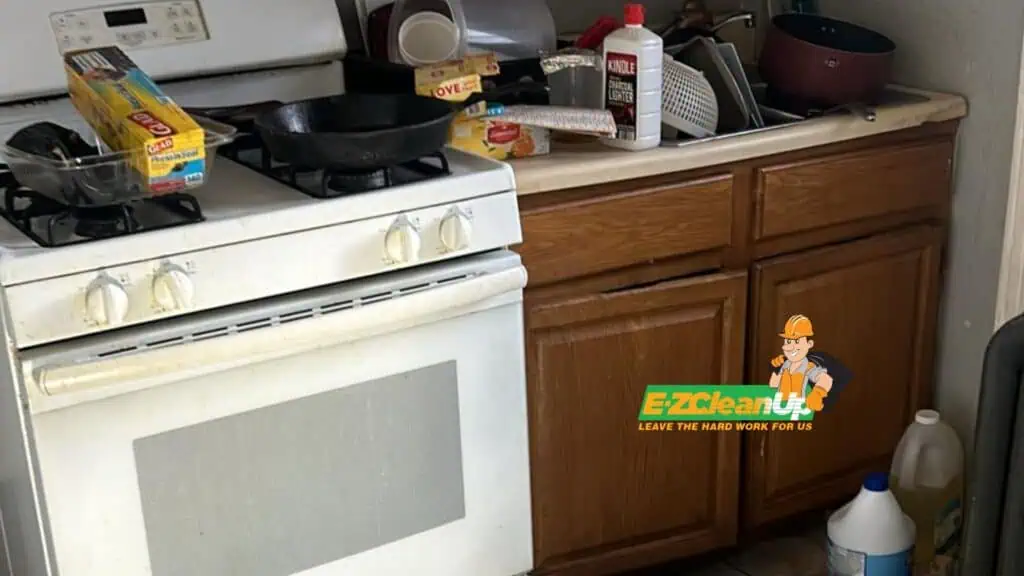
Stoves and Ovens
Evaluating whether to repair or dispose of your stove or oven starts with considering its age and the cost of potential repairs. Older models might not be as energy-efficient and could be more costly to maintain than buying a new one.
Assess the performance issues—if the appliance frequently breaks down or performs poorly, it might be time to replace it. Consulting with a professional appliance repair service can help determine if your appliance is worth fixing or if it’s more economical to upgrade.
Safe Removal of Connected Utilities (Gas or Electric)
The removal process for stoves and ovens must be handled with care, especially when disconnecting gas or electrical connections:
- Gas Stoves: Ensure the gas valve is completely turned off before disconnecting the stove. It’s highly advisable to hire a qualified professional to handle the gas connections to prevent leaks or accidents
- Electric Stoves: Disconnect the power by unplugging the stove or turning off the circuit breaker. Double-check that the power is truly off to avoid any electrical hazards during removal.
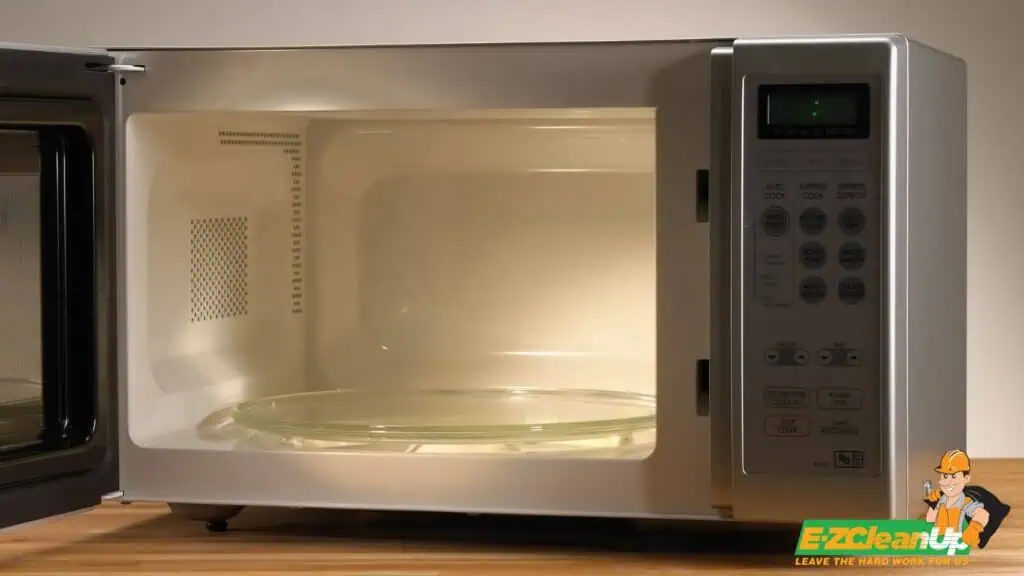
Microwaves
Before disposing of your microwave, assess its current functionality and lifespan. Typically, a microwave lasts about eight years, but this can vary based on how frequently it’s used and its maintenance.
Microwaves used more intensively may have a shortened lifespan. If your microwave still functions adequately, it may be more beneficial to sell or donate it rather than dispose of it. Otherwise, if its performance is declining and repairs are impractical, recycling might be the best option.
Preparing for Disposal or Donation
If your microwave is still in good working condition, consider donating it to local charities, schools, or community centers, which can significantly extend its useful life. Alternatively, selling the microwave online through online platforms can also be effective.
Water Heaters
The first step in deciding whether to dispose of a water heater is assessing its condition and efficiency. Check if the water heater still meets your needs or if it’s causing increased energy bills due to inefficiency.
Typically, water heaters have a lifespan of about 8-12 years. If it’s nearing the end of this range and experiencing frequent issues or inefficiencies, it might be time to consider replacement.
Draining and Disconnecting Before Removal
Before removing a water heater, ensure it’s properly drained and disconnected:
- Draining: Attach a garden hose to the drain valve at the bottom of the water heater, open the valve, and allow all the water to flow out. This step is crucial to avoid spills and facilitate easier handling.
- Disconnecting Utilities: For gas water heaters, turn off the gas supply and carefully disconnect the gas line using appropriate tools. For electric heaters, ensure the electricity is switched off from the main circuit before disconnecting any wires.
Disposal Options for Bulky Appliances
When it comes to disposing of bulky appliances, you have several environmentally responsible options to consider. Each type of appliance may have specific disposal requirements due to the materials and chemicals they contain.
Municipal Trash Pickup Services: Limitations and Scheduling
Most municipalities provide special pickup services for large appliances, but there are often specific rules and fees associated with them. For example, certain items may require advance scheduling and could incur a pickup charge.
For refrigerators and air conditioners in particular, these services typically call for the removal of refrigerants like Freon by a qualified technician prior to collection.
Bulk Waste Collection Days: Availability and Regulations
Many cities and towns designate specific days for bulk waste collection, which can include large appliances. It’s important to check local regulations, as these events might have restrictions on the types of items accepted.
Some appliances might be excluded unless they meet specific preparation standards, such as the removal of doors or locking mechanisms for safety.
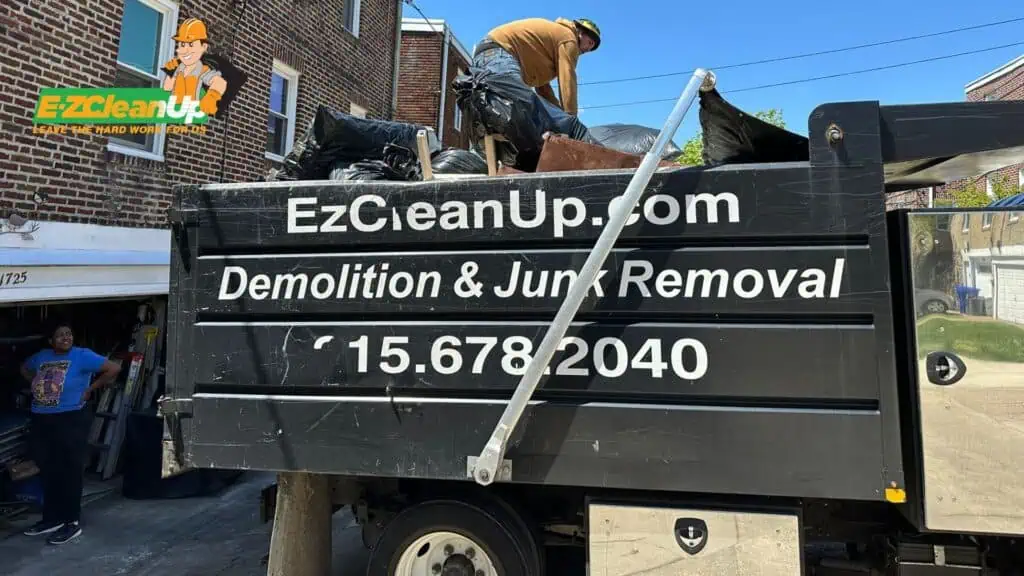
Hiring Junk Removal Services: Costs and Considerations
Professional junk removal services, like EZ CleanUp, offer a convenient way to dispose of large appliances without the hassle of transporting them yourself. At EZ, we offer pick up services for the appliances directly from your home.
This provides an all-inclusive service that covers lifting, loading, and proper disposal or recycling of the items. The cost varies based on the appliance and the service provider. You can check our pricing page to get an idea of the costs involved in disposing of bulky appliances.
Additional Disposal Options
Here are the other options you can look into when deciding to get rid of your appliances:
Retail Take-Back Programs
Major retailers like Home Depot, Best Buy, and Lowes offer haul-away services when you purchase a new appliance. They often recycle the old one for an additional fee. This service is particularly useful when the appliance is large and difficult to transport.
Recycling and Donation
Many local recycling programs accept large appliances and ensure that hazardous components, such as Freon in air conditioners and refrigerators, are safely processed.
Organizations like Earth911 provide a recycling locator to help find the nearest facility accepting large appliances.
On the other hand, charitable organizations such as Habitat for Humanity ReStores accept donations of new and gently used appliances. These donations support affordable housing projects and are sold in retail outlets to fund these initiatives.
Many ReStores offer free pickup services for large items, making it convenient for donors to give away appliances without needing to transport them. Other organizations, like the Salvation Army and local thrift stores, often accept appliances in working condition and sometimes offer pickup services.
Selling or Giving Away
For appliances that are still functional, selling them or giving them away through community boards or online platforms like Craigslist and Facebook Marketplace can be a good option.
When selling or giving away, ensure the appliance is clean and in good working condition to maximize its value and usefulness to the new owner.
Special Considerations for Hazardous Appliances
When disposing of hazardous appliances, specific procedures must be followed to comply with environmental regulations and ensure safety. Here’s a breakdown of the steps for different types of hazardous appliances:
Appliances Containing Freon (Air Conditioners, Refrigerators)
A qualified technician must evacuate the Freon before disposing of, recycling, or selling the appliance. Once Freon is removed, appliances must be taken to a facility capable of safely handling them.
Electronics and Appliances with Lithium Batteries
Handling electronics like laptops, smartphones, and appliances with lithium batteries requires caution due to the risk of fire if damaged.
Lithium batteries should be removed and recycled separately from the appliance. This prevents potential hazards during the recycling process of the rest of the appliance.
Only facilities equipped to handle and recycle lithium batteries should process these components. They ensure safe handling and prevent environmental contamination.
Legal Disposal Requirements (Avoiding Fines and Penalties)
When disposing of appliances containing hazardous materials, proper documentation that verifies the safe removal of hazardous substances like Freon is necessary. This documentation should accompany the disposed appliance to the recycling facility.
The EPA sets forth specific regulations for the disposal of appliances containing ozone-depleting substances. Compliance with these regulations ensures that the disposal processes minimize environmental impact and legal risks.
Proper disposal of hazardous appliances not only complies with regulatory requirements but also contributes to environmental sustainability by preventing the release of harmful substances into the ecosystem.
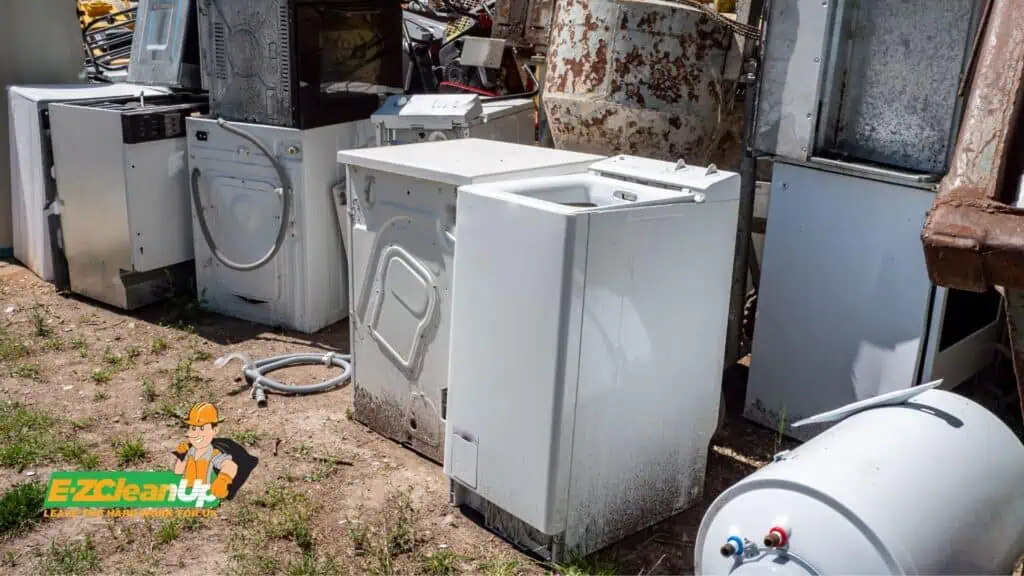
Hassle-Free Bulky Appliance Disposal With EZ
Dealing with bulky appliances, particularly when they are no longer functional, can be a difficult task. From going over local disposal regulations to the physical strain of removal, the process is rarely straightforward. But why handle it alone?
EZ CleanUp specializes in the seamless removal of bulky items directly from your home. We offer comprehensive services—from lifting and hauling to responsible disposal or recycling of your bulky appliances, provided they are free of hazardous materials. .
Ready to clear out that old fridge or bulky dishwasher? Let us handle the heavy lifting. Contact us for effortless appliance removal.

